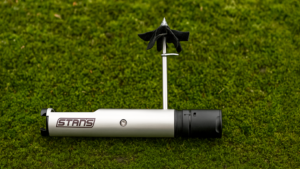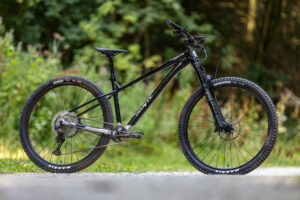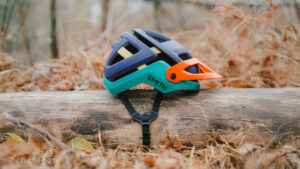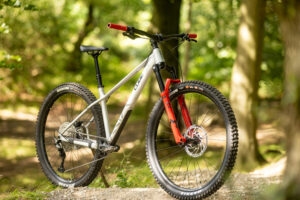Best shape on test but the suspension isn’t the most sensitive
Ibis Ripmo XT 1X Werx review
Designed to meet requirements for tough EWS races, the Ibis Ripmo is a longer travel 29er from a brand with reputation for fast pedalling, efficient bikes.
>>> The best enduro mountain bikes

Ibis Ripmo review
Longer in reach and more progressive than previous models, the carbon Ripmo frame sports 145mm travel. The geometry is designed around a 160mm fork with the increasingly common reduced 44mm fork offset. The shorter offset increases trail, which in turn increases the stabilising force on the steering, so according to Ibis the 65.9° head angle feels more like 64.5°.

Lower link rotates on bushings as a weight-saving measure
Suspension
Primarily to save weight, the lower link of the DW-link suspension rotates on sealed IGUS bushings rather than bearings. This is unusual for a new bike, so we removed the shock and cycled the suspension check for added resistance. Thankfully, at slower rotational speeds it wasn’t overly sticky.
By our measurements, the Ripmo has just under 140mm of useable travel, but even with the least suspension, it doesn’t lack cushioning on the trail.
The (£200 upgrade) Fox Factory X2 shock feels controlled and calm; a trait that amplifies a composed suspension feel. Ibis provides detailed shock settings, but tuning the four-way adjustable damping perfectly is still complicated if you’re not confident about how the settings interact.
There’s more gold Kashima coating on the Fox 36 Float fork with its proven RC2 damper and newer, increased volume EVOL negative air spring. However, it still transmits more vibration into your hands compared to the smoother RockShox Lyrik RC2 and Fox GRIP2 forks.

Fox Float X2 shock is a £200 upgrade
Components
The workhorse Shimano XT gearing is solid, but not that glamorous for this much cash. Shimano XT M8000 disc brakes stopped fine, but we’ve had multiple bite point issues, and the new 4-piston version would prove more consistent and powerful on long downhills.
Ibis adopted wider rims and tyres in its infancy, and the rear end on the Ripmo can easily accommodate 2.6in tyres. Unfortunately, even though its own 35mm asymmetric 942 wheels came with Maxxis WT 2.5in high volume rubber for extra comfort and grip, the carbon rear rim cracked across the valve hole early in the testing process. It wasn’t catastrophic, but slowly got worse and is hardly ideal on such a high-end carbon wheelset and bike.
Ibis’s own-brand carbon handlebars weren’t really to our taste either. Lacking sweep and overly stiff, we instantly swapped them out to the sound of seized 3mm bolts in the Thomson stem.

Cracked rim tarnished our time on the Ibis
Performance
Given Ibis’s reputation, it’s hardly surprising that the Ripmo pedals very efficiently. The carbon frame is stiff and solid without feeling harsh, and the stubby DW-links provide a tight connection between both ends of the frame for a precise steering response.
Up the steepest pitches in the 46t XT cog, there’s a great seated riding position, but some interaction between chain forces, rider weight shifts and suspension causes ‘pulsing’, with power surging initially, then dipping for the rest of the pedal stoke. The end result is it’s not as efficient at climbing as the Santa Cruz Hightower LT.
In terms of pure downhill speed, the Ripmo has good geometry and stability, where the high-volume tyres and Fox dampers provide composure at speed. On bigger hits and compressions the rear end has a tendency to rush through the midstroke, which can make the front tyre feel light exiting deep, punchy turns.
Adding air to the shock and running 25% or less sag tightens up the rear end, but adds choppiness over repeated hits, even with high-speed compression backed off.

Verdict
With dialled sizing and geometry, and great detailing, the Ibis Ripmo is a sleek, super-light machine that pedals and climbs quickly and urgently. With the Fox Float X2 shock it’s harder to get the Ibis suspension dialled in, and there’s marginally less grip, comfort and tracking than expected. The Intense Carbine and Santa Cruz Hightower LT both feel smoother then, as well as more chuckable and fun on flowy trails, so even if Ibis’s expensive carbon wheel didn’t crack within a week of testing, the Ripmo still wouldn’t have won this test.
















